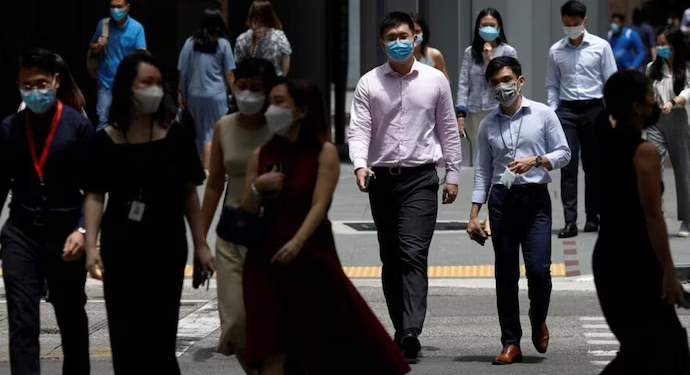COVID-19 has once again captured public attention in India as search trends show a spike in queries about the virus. This renewed interest comes amid concerning reports of rising infection rates across Asia, particularly in densely populated urban centers like Hong Kong and Singapore. As memories of the pandemic’s peak begin to fade for many, this new wave serves as a reminder that COVID-19 continues to circulate and evolve.
A New Wave Sweeps Across Asia
Health officials across Asia are sounding the alarm as COVID-19 cases show a marked increase in multiple countries. Hong Kong and Singapore, two of Asia’s most connected international hubs, are at the forefront of this surge, reporting significant spikes in positive cases.

In Hong Kong, Albert Au, head of the Communicable Disease Branch at the Centre for Health Protection, recently told local media that COVID-19 activity in the city has reached “quite high” levels. The number of respiratory samples testing positive for COVID-19 has hit its highest point since last year, while severe cases and deaths have also climbed. During the week ending May 3, authorities recorded 31 severe cases—a concerning indicator of the virus’s continued potential for serious harm.
While current infection rates haven’t reached the peaks seen during major outbreaks of the past two years, multiple indicators suggest widespread community transmission. COVID-19 has been detected in sewage water monitoring systems, and healthcare facilities are reporting increased visits from patients exhibiting symptoms consistent with the virus that brought the world to a standstill five years ago.
Singapore’s Rising Numbers
Singapore, another densely populated Asian city, is experiencing a similar trend. The country’s health ministry recently released its first COVID update in nearly a year, reporting approximately 14,200 cases during the week ending May 3—a 28% increase from the previous week. More concerning is the approximately 30% rise in hospital admissions related to COVID-19.
It’s worth noting that Singapore only issues case number reports when there’s a definitive increase, making this announcement particularly significant. While health officials suggest the surge may reflect waning immunity across the population, they have not found evidence that new virus strains are more infectious or cause more severe illness.
Broader Asian Trend
This pattern extends beyond just these two cities. Across Asia, COVID-19 infections have been increasing for months, with periodic waves of infection becoming a recurring feature of public health monitoring. China, the region’s largest country, is reportedly experiencing a new COVID wave projected to approach the peak levels observed last summer. The positivity rate among tested individuals in China has more than doubled over the five weeks through May 4.

Thailand has reported two major COVID outbreaks this year alone, with a notable spike following April’s Songkran festival—an event characterized by large public gatherings that create ideal conditions for viral spread.
What makes this current surge particularly noteworthy is its timing. COVID cases are rising during summer months when respiratory viruses typically become less prevalent. This seasonal resilience suggests COVID-19 will remain a persistent health challenge regardless of seasonal conditions.
Waning Immunity and Public Health Response
Health authorities across the region attribute this new wave partly to declining immunity levels in the population. As time passes since initial vaccination campaigns and previous infection waves, collective immunity naturally wanes, creating new opportunities for viral spread.
In response, health officials are emphasizing the importance of vaccination coverage, particularly urging booster shots for vulnerable populations. These recommendations come as public attention to COVID precautions has significantly decreased compared to previous years.
The impact of this wave is being felt beyond public health statistics. In the cultural sphere, Hong Kong pop star Eason Chan tested positive for COVID-19 and was forced to postpone his concerts in Taiwan, according to his official Weibo account—a reminder of how the virus continues to disrupt daily life and public events.
Implications for India
As COVID trends on Google searches across India, health experts suggest this reflects understandable public concern about the virus’s potential spread to the subcontinent. With its high population density and extensive connections to affected regions, India has historically been vulnerable to COVID waves that first emerge elsewhere in Asia.
The trending searches likely represent a proactive interest in understanding risks and preventive measures as news of rising cases spreads. While no dramatic increase has been reported in India yet, the experiences of neighboring countries suggest vigilance remains important.
As this situation continues to develop, health authorities recommend staying informed, ensuring vaccinations are up to date, and maintaining basic precautions—particularly for those at higher risk of severe disease.
ALSO READ TOP STORIES FROM VERILY NEWS


















